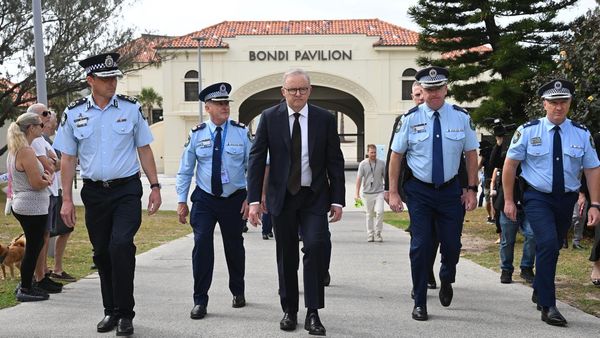
Prime Minister Anthony Albanese’s cancelling of a grant of $18 million in public money, given to a charity after the Governor-General David Hurley had lobbied for it, has left two poles of power in Canberra unusually at odds.
“It was not worthy of proceeding,” Mr Albanese said of the now-revoked Australian Future Leaders Program funding in question time on Thursday.
‘‘This grant obviously doesn’t pass muster.’’
This break with the oldest tradition of talking deferentially towards the Queen’s representative was a jarring note in question time.
Unlike with former PM Scott Morrison’s secret adoption of multiple ministries, there have been no further embarrassing releases of documents regarding the application made by Mr Hurley’s associates.
The details are shrouded in secrecy like all others connected to decisions of the nine-MP budget committee.
An election message
A clever parliamentary gambit by independent MP Monique Ryan would have forced the government to block her move to cancel the grant and implicitly approve of the secret and uncompetitive process that led to its being awarded.
The government concluded the public had expressed a view about the ethics on display at the centre of Australian politics at the election. It would have undermined legitimacy more to act as though this had not happened.
Some conservative media, though, in deference to tradition, have almost run a blackout on questions over the Governor-General’s charity.
Tweet from @Mon4Kooyong
And so on Thursday night the majority view in government was that Mr Hurley seemed to be digging in.
The Governor-General’s prestige makes the office vulnerable to criticism and the circumstances about the $18 million grant seemed destined to continue as social media investigations continued.
“The office of the Governor-General is not so much above politics as it is not of politics,” says Douglas Sturkey, a former top governor-general’s adviser in the 1970s.
“Once you start asking if it’s being affected, you have already engaged it in politics.”
A new scrutiny
The story of how the most powerful men in Australia struck a private deal on such a sum of money, only to be foiled at the last minute, will likely stay secret because of vice-regal protections.
But the hint of fascinating detail has driven scrutiny of the vice-regal office to new levels.
Examinations have led people to remark upon the degree to which it was already politicised.
The G-G’s private office was put to work (of its own accord) to provide administrative staff to the Global Foundation summit, a seriously conservative affair that makes a point of reaching out to Labor’s right wing.
One attendee, who wished to remain anonymous, recalled a function in Sydney where mostly ‘‘inane’’ speeches were heard. They couldn’t confirm if Mr Hurley joined in. Given that standards are discussed so often in hushed tones the use of public funds for of the political spectrum should have met scrutiny.
They said the monotony cracked when the Governor-General’s wife, Linda, began to sing the Vera Lyn classic We Will Meet Again in front of 150 medium to big-wigs, including former Liberal Party boss Brian Loughnane and ex-Telstra chief David Thodey.
Mrs Hurley has performed the same song in front of former US vice-president Mike Pence. But it was her habit of bringing social shame upon cabinet ministers who did not join in that became a problem.
Episodes like this and the couple’s decision to appear in an advertisement for a builder doing the $1 million renovation on their private home are bringing scrutiny like never before.
The Governor-General’s business partner, Chris Hartley, an expansive Englishman who was to become the boss of Australian Future Leaders Program, seems to suggest again that the office had grown out of touch.
Does not figure
Mr Hartley’s previous charity – which held curry eating days and tugs of war between private school kids and visiting Nepalese soldiers as fundraisers for the country’s Gurkhas – received positive coverage and Liberal MP endorsements.
But it ended in deficit and twice defaulted on its finances, according to documents filed with the regulator.
Mr Hartley did not respond to a request for comment.
Questions are mounting anew about the failure of the grants process to prevent a man from being handed $18 million, despite having no business plan.
Mr Hartley discreetly tipped the tabloids off about his place in Princess Anne’s inner circle and served in a leadership position in one of England’s oldest elite clubs.
He received an honorary law degree and only ever listed his occupation as ‘‘consultant’’ on public documents.
“He had an easy confidence that he could bring people from the military along,” one observer said of the 2017 meeting at Admiralty House.
“I never could figure out what he did for a job though.”







